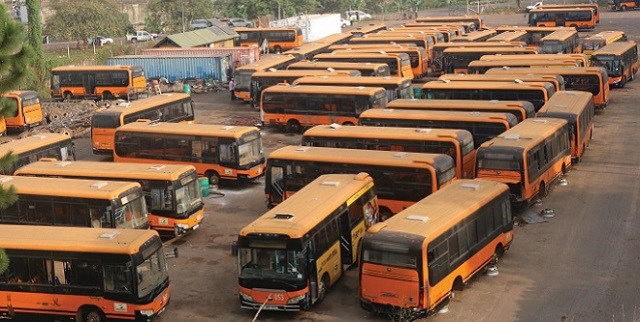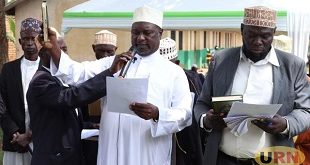
Creditor plan to auction buses to recover Shs 151 mn debt
Kampala, Uganda | ISAAC KHISA | On the road leading to the Western gate of the Mandela National Stadium, located about 8 kilometres away from Kampala City Center on the Kampala-Jinja highway, one would easily observe that something wrong.
Nearly three dozens of Pioneer Easy Buses with no wheels are parked at the Stadium’s parking area, as a section of mechanics clad in over-sized green and blue aprons are carrying out inspection and repairs to the buses. Some of the buses, however, appear to be degenerating towards the irreversible status.
A section of the company’s staff told The Independent that lack of spare parts on the local market is one of the reasons behind the grounding of the orange-coloured buses.
“The problem with these buses is that there are no spare parts sold locally,” sources told The Independent. “Management has to import all spare parts from China – where these buses were purchased.”
The sources added that the bus company is increasingly facing stiff competition from the 14-seater commuter taxis that have since reduced their fares to match Pioneer’s fares.
And to make the situation even worse, there is a looming auction of at least 26 buses to recover Shs141million owed to a business man, Charles Mushabe.
Bonnie Rwamukaaga, a bailiff at Libra Auctioneers, told The Independent in an interview that Mushabe and his lawyers, Lex Uganda Advocates and Solicitors, are working on the paperwork required by court to have the company’s buses attached and auctioned.
He said the move follows the company’s inability to defend itself in court after securing a temporary injunction last year for the then planned auction.
However, Esther Kemigisha Tayebwa, a senior partner KNT Advocates and the PEB legal advisor said she was yet to receive an update about the company’s pending court case.
The company’s woes stem from a 2014 judgment delivered by Nakawa Court ordering it to pay businessman Charles Mushabe Shs141 million for the supply of spare parts.
James Kasiita, the company’s information systems analyst, who also doubles as the public relations officer, told The Independent that the 2-year closure of the PEB at the onset of its operations and the subsequent requirements to remit taxes and dues to Uganda Revenue Authority and Kampala Capital City Authority affected its cash flow.
“Regular payments of taxes to URA and KCCA affected our cash flow to maintain buses,” he said. “We also have to pay our staff totalling 150.”
URA impounded 100 buses belonging to PEB in 2013 – just after spending a year in business – for failure to clear outstanding tax debts amounting to Shs 8 billion.
Though the company was allowed to operate 10 months later, after negotiation and an agreement to pay between Shs270million and Shs300million monthly within 24 months, plans to resume operations early 2014 were put on hold, pending a review of a contract signed with Kampala Capital City Authority.
This was intended to accommodate the interests of authorities in Mukono and Wakiso Districts as the Pioneer buses were to ferry passengers to and from the two districts as well.
And while a fresh contract was eventually drafted and agreed upon by all the four parties, it could not be signed until the government had revised its Road and Public Safety Act to regulate the activities of city commuter buses.
Currently, PEB ply around a few parts of Kampala City. These are Kampala-Kireka-Banda-Kyambogo-Nakawa-Bweyogerere route; Kampala-Luzira-Kitintale-Bugoloobi route; Kampala-Kajansi and Kampala-Namugongo routes.
It charges range between Shs 500- Shs 1, 000 depending on the distance covered by the passenger.
“We operate three trips a day on each route yet we would be making five if we had a special lane for our buses as agreed in the contract with KCCA,” Kasiita said, adding that full implementation of the contract would have enabled the bus company generate more revenue.
Though the executives were cagey to disclose the company’s revenue performance, The Independent analysis shows that each bus carrying 61 passengers at full capacity per trip would generate about Shs 360,000 per day, translating into Shs 9.36 million per month and Shs112.3million per year excluding taxes and operating expenses.
This implies that if all the 100 buses are in operation, PEB would be making at least Shs11.2billion in revenue per annum.
Efforts to get a comment from KCCA Publicist Peter Kauju or his assistant Robert Kalumba on the issue of special lanes allocated to PEB were futile as they could not pick our repeated calls.
Previously, KCCA officials have said the process to give PEB exclusive routes would be executed in collaboration with the Ministry of Works and Transport as one avenue of ensuring order in public transport in the city prevail.
Towards the end of 2013, there were reports that President Yoweri Museveni had been approached by a section of people with interest in PEB business for executive advice on this matter.
He was quoted as saying that he would support the proposal by KCCA to give exclusive routes to the company. It is not clear up to now why this move has not seen light of day. Is this a potential cause for PEB’s troubles or the entire business strategy was wrong?
Brains behind PEB
Launched in 2012, the Pioneer buses were welcomed by city residents as they were seen as a long awaited solution to reducing public transport costs and eliminating disorder created by the 14-seaters.
Prior to its financial troubles, PEB had purchased 100 buses and planned to import more units progressively, until it met the 522 units that it agreed upon with the KCCA.
First incorporated in 2005, the company lists former Privatization Minister and National Resistance Movement (NRM) historical cadre, Matthew Rukikaire and businessman Fred Senoga as chairman and secretary respectively, according to the registrar of companies.
Rukikaire owns 45.04 % shares in the company. The other shareholders, according to available records, are former Premier Kintu Musoke, Former Deputy Premier Eric Adriko, Faizal Kasujja, a banker, Muhammed Kasajja, a real estate developer and Ida Wandendeya.
 The Independent Uganda: You get the Truth we Pay the Price
The Independent Uganda: You get the Truth we Pay the Price



